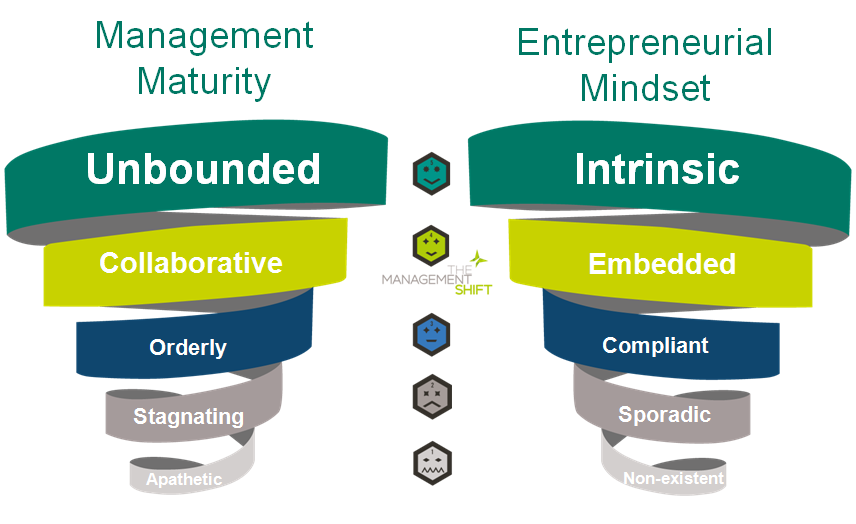It is commonplace to talk about the need for more entrepreneurial ways of running businesses, not least because we live in a highly unpredictable world. Not only are societies and technology constantly changing, but new business models are emerging. The ‘gig economy’ features services such as the Uber, and Airbnb who hire ‘gigging’ contractors, rather than conventional employees.
And it is increasingly recognized that high levels of entrepreneurship are needed for survival in the wider economy. Steve Denning, in his blog in March, made a convincing case that the entrepreneurial firms are outperforming the firms still wedded to the practice of ‘maximizing shareholder value’ and narrow financial measures[1].
But what does an entrepreneurial way of working actually entail, and how can businesses, large and small, established and new, nurture and sustain it?
One thing is clear; having an innovative set-up doesn’t guarantee an entrepreneurial culture. In September, for example, the fast food service UberEats was affected by a protest by its couriers, over progressive erosion of their hourly rate[2].
All the evidence linking high levels of motivation and leadership ability to inspire high performance is every bit as relevant in the gig economy as elsewhere, because you are still dealing with people. The good news is that there is now a substantial body of evidence demonstrating how to build and sustain an innovative culture. What the research tells us is that the quality of leadership is central. And it can best be improved when the enterprise is understood as a community, based on relationships. It is not a set of resources, which may be the assumption in a corporation; nor is it just a set of transactions, which may be the assumption in the gig economy.
The concept of ‘Levels’ of management maturity, organizational climate and performance (Figure 1), from the highly dysfunctional Level 1, to the unbounded and passionate Level 5, is firmly backed by my research[3]. At the highest Levels of operation, entrepreneurial ways of operating emerge naturally, because the whole purpose is to ensure that teams of people are empowered to think of new services, new technologies, new ways of working, within a collaborative environment, to help the customer.
A particularly significant change comes from moving from an orderly but uninspired culture, or Level 3, to high engagement at Level 4.
At each of the 5 Levels of management maturity and organisational culture, there is a different drive for entrepreneurial mindset/spirit. At Level 1 entrepreneurial thinking is almost non-existent, and at Level 2 it is random and sporadic. At Level 3 it is compliant in nature, as employees attempt entrepreneurial tasks only when they are asked to do so by their manager. Then at Level 4, entrepreneurial thinking becomes embedded in organisational culture. At this Level, employees have autonomy to experiment with new ideas, they can make decisions on the basis of their knowledge rather than a formal position in organizational hierarchy and they collaborate with diverse teams.
Finally, at Level 5 entrepreneurial mindset becomes intrinsic, and it gets embedded sub-consciously in employees as there are no limits in thinking about what can be achieved.

Figure 1: Management maturity and entrepreneurial mindset
Facilitating the shift from Level 3 to Level 4 is an approach that often results in dramatic transformations. What we have learned is that moving up the Levels is typically not a straightforward, linear process. Above all, it is multi-dimensional.
When trying to rise above ‘command and control’, or Level 3, it is necessary to handle the transition carefully, with sufficient preparation for more autonomous ways of working.
There is a need to monitor and nurture attitudes as well as abilities and the organizational set-up. Mindsets are crucial. You cannot produce an entrepreneurial climate with ‘command and control’ mindsets, in which people are looking for a rule-book rather than new opportunities; or if unfairness emerges in working arrangements, as occurred at UberEats.
The discipline of continually measuring workplace climate provides an early warning sign of potential problems. Ideally the monitoring is in different dimensions; and is not simply a gauge of the overall climate. Data on engagement indicates the level of passion or enthusiasm within a team.
Organizations need leaders who understand the connection between the causes and the effects of culture; and the immense value of operating at the higher Levels. Such leaders encourage entrepreneurship, but allied to the common good. Discipline is maintained through a system of accountability, honest communication, and adherence to the organization’s positive values.
Once a substantial body of organizational leaders adopt this approach, and the practices to support it, the change is transformational; not only for the organization and its customers, but for wider society, as thriving enterprises become more sustainable. Peter Drucker once commented that an organization is one of the most noble creations for the prosperity of society. We now have much practical experience and knowledge to help us implement this far-sighted vision.
About the author:
Professor Vlatka Hlupic is an international award-winning thought leader, an author of “The Management Shift” book and founder of The Management Shift Consulting Ltd and Drucker Society London.
[1] How Close Are We To An Entrepreneurial Society?, Steve Denning Drucker Blog 28 March 2016, https://www.druckerforum.org/blog/?p=1155
[2] When Your Boss is an Algorithm, FT 8 September 2016, https://www.ft.com/content/88fdc58e-754f-11e6-b60a-de4532d5ea35
[3] Vlatka Hlupic: How to Harness the Power of People and Transform Your Organization for Sustainable Success, Palgrave Macmillan, Basingstoke, October 2014.

